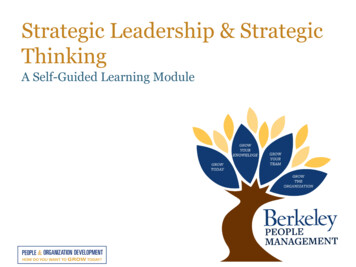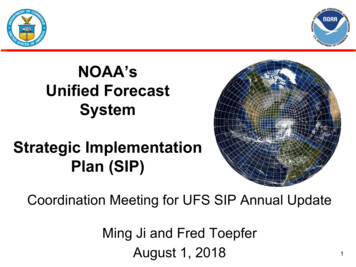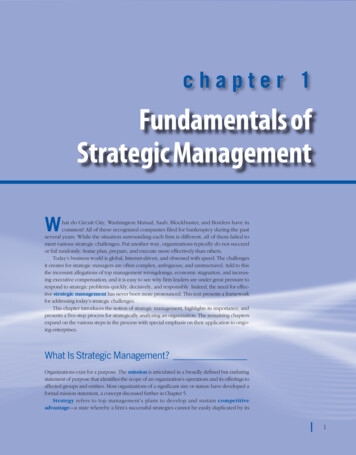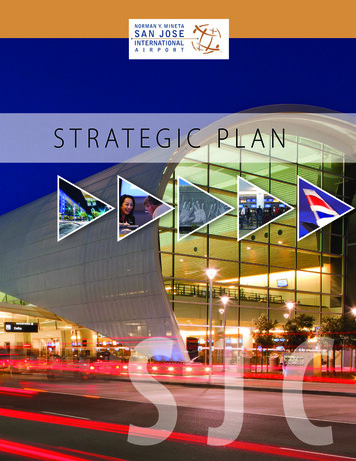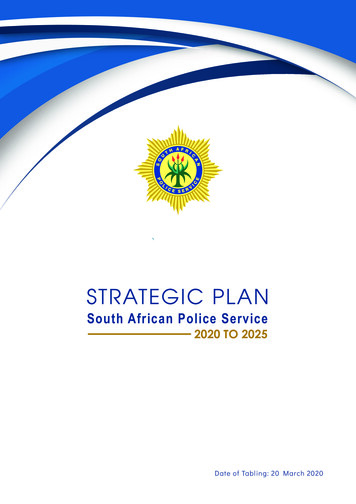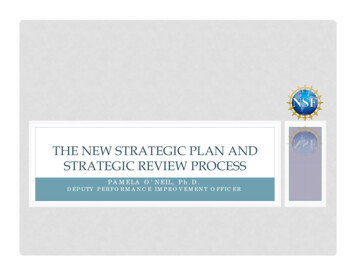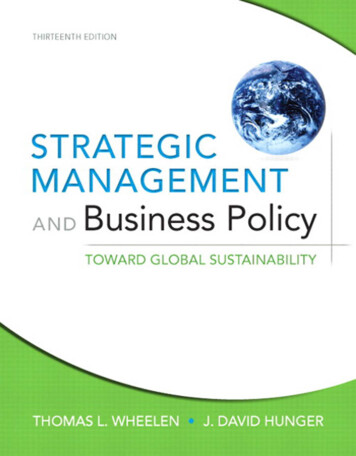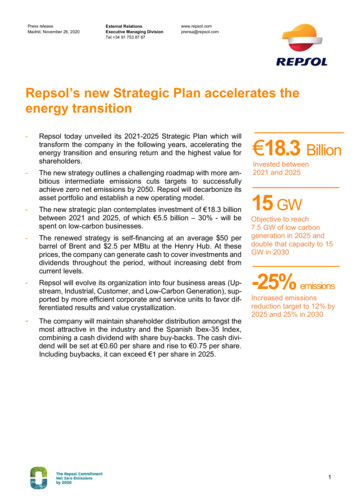
Transcription
Press releaseMadrid, November 26, 2020External RelationsExecutive Managing DivisionTel. 34 91 753 87 87www.repsol.comprensa@repsol.comRepsol’s new Strategic Plan accelerates theenergy transition-Repsol today unveiled its 2021-2025 Strategic Plan which willtransform the company in the following years, accelerating theenergy transition and ensuring return and the highest value forshareholders.-The new strategy outlines a challenging roadmap with more ambitious intermediate emissions cuts targets to successfullyachieve zero net emissions by 2050. Repsol will decarbonize itsasset portfolio and establish a new operating model.-The new strategic plan contemplates investment of 18.3 billionbetween 2021 and 2025, of which 5.5 billion – 30% - will bespent on low-carbon businesses.-The renewed strategy is self-financing at an average 50 perbarrel of Brent and 2.5 per MBtu at the Henry Hub. At theseprices, the company can generate cash to cover investments anddividends throughout the period, without increasing debt fromcurrent levels.-Repsol will evolve its organization into four business areas (Upstream, Industrial, Customer, and Low-Carbon Generation), supported by more efficient corporate and service units to favor differentiated results and value crystallization.-The company will maintain shareholder distribution amongst themost attractive in the industry and the Spanish Ibex-35 Index,combining a cash dividend with share buy-backs. The cash dividend will be set at 0.60 per share and rise to 0.75 per share.Including buybacks, it can exceed 1 per share in 2025. 18.3 BillionInvested between2021 and 202515 GWObjective to reach7.5 GW of low carbongeneration in 2025 anddouble that capacity to 15GW in 2030-25% emissionsIncreased emissionsreduction target to 12% by2025 and 25% in 20301
Press releaseMadrid, November 26, 2020External RelationsExecutive Managing DivisionTel. 34 91 753 87 87www.repsol.comprensa@repsol.comJosu Jon Imaz, Repsol Chief Executive Officer:-“With this new Strategic Plan, which leverages our strengths, we aretaking a significant step towards becoming a net zero emissions company, outlining a profitable and realistic roadmap that will allow us togrow, maximize value for our shareholders, and assure the future.”-“Our strategy is based on a multi-energy offering that combines all thetechnologies for decarbonization of energy. We will be more efficientand increase our renewable energy objectives as well as our manufacture of products with a low, neutral, or even a negative carbon footprint.We will promote circular economy initiatives, develop new energy solutions for our customers, and boost cutting-edge projects to reducethe industry’s carbon footprint.”Repsol today unveiled its strategic plan for the years 2021 to 2025, during which it will advance in its netzero emissions objective with a project that accelerates transformation while maintaining a strong cashflow to finance ambitious growth and attractive shareholder distribution.The company will decarbonize its asset base and implement a new operating model that will extract valuefrom its current strengths as well as add new pillars to support the company’s future such as the Customerand Low-Carbon Generation Businesses. By 2030, Repsol will be a company that is renewed, more sustainable, and more focused.By 2030, Repsol will be arenewed, more sustainable,and more focused companyThe new strategy will be highly flexible in relation to the macroeconomic environment. It is being set in motion at a time of historicdifficulty to which Repsol already responded with its ResiliencePlan 2020 that produced positive cash flow in every business in thefirst nine months of the year and estimated savings for the wholeyear of 2.4 billion.In this highly uncertain environment, the company has established two differentiated periods in its StrategicPlan. In the first two years, it will focus on ensuring financial strength, extending the efficiency and competitivity programs which began in March of this year.The Strategic Plan is self-financing at an average 50 per barrel of Brent and 2.5 per MBtu at the HenryHub. At these prices, the company can maintain a high degree of financial flexibility and keep debt unchanged from current levels through 2025.During the first period of the plan, efficiency, investment cuts, and optimization of capital will be prioritizedtogether with projects to lead the energy transition, including those already announced for the Bilbao andCartagena refineries and the numerous renewable energy projects that Repsol is currently building. From2022, with recovery from the impact of Covid-19, the focus will shift to the acceleration of growth.2
Press releaseMadrid, November 26, 2020External RelationsExecutive Managing DivisionTel. 34 91 753 87 87www.repsol.comprensa@repsol.comA total of 18.3 billion will be invested during the new five-year plan. Low-carbon spending will reach 5.5 billion between 2021 and 2025 – 30% of the total – which will be accompanied by a continued international expansion. Over the course of the period, Repsol aims to substantially increase EBITDA, to morethan 8.2 billion in 2025.In a scenario of continued higher prices, Repsol will accelerate the growth of low-carbon projects in itsportfolio.A new operating modelRepsol will evolve its organization by deploying four business areas (Upstream, Industrial, Customer, andLow-Carbon Generation), supported by more efficient corporate and service units to favor increased results and value crystallization.The new business model contemplates the incorporation of partners or investors to the Low-Carbon Generation business or even a possible listing on the stock exchange to decisively accelerate the achievementof objectives and guarantee a higher return from our operations.Digitalization will play a key role in the new organization thanks to artificial intelligence, automation ofoperations, and cloud-based solutions. The company expects the plan to provide a positive impact of thedigitalization projects that already in 2022 will surpass 800 million a year, compared with the start of thedigitalization program in 2018.A customer-centric business to build a multi-energy offeringIn the new business model, Repsol will create a Customer Unit to globally satisfy all energy and mobilityneeds of its customers, currently more than 24 million. The unit will bring together the existing Mobility,LPG, Electric Mobility, Power and Gas Commercialization, Energy Solutions, and Lubricants businesses.This new branch will become the leading multi-energy supplier in the Iberian Peninsula, increasing theweighting of low-carbon energy and developing digital products and tools that will allow for more personalized offers and improved customer experience. The company has a unique value proposition and competitive advantages to offer clients a differentiated global service. The new transversal loyalty program willgrow from the existing two million digital customers to eight million by 2025.3
Press releaseMadrid, November 26, 2020External RelationsExecutive Managing DivisionTel. 34 91 753 87 87www.repsol.comprensa@repsol.comThe plan sets the objective to increase the EBITDA of this unit by 1.4 times, reaching 1.4 billion in 2025.The company also expects to increase the number of power and gas as well as electric mobility customersto two million.A global low-carbon generation operatorThe Low-Carbon Generation Business is one of the four pillars in the new organizational model. It willcontinue to increase its asset portfolio, as well as the already launched international expansion. The objective is to become a global operator, with a generation capacity of 7.5 gigawatts (GW) by 2025 and 15GW by 2030.The company is planning to continue the organic growth of this business through the development of a portfolio of projects in operation that will grow at an annual rate of morethan 500 MW between 2020 and 2025.Among the initiatives that are under consideration is a 1 GW enlargement of the capacity ofthe pumped storage station at Aguayo(Spain). This will be the largest investment inthe history of the region of Cantabria (approximately 700 million). In addition, further acquisition of assets will boost the expansionoutside of Spain.Between 2025 and 2030, Repsol will accelerate the organic growth of its generation capacity with thedevelopment of projects that will add more than 1 GW of installed capacity every year.The EBITDA of this business will be multiplied by eight, compared to 2019, to 331 million. Investmentswill reach 1.4 billion a year by 2025, eight times more than those made in 2019.Transformation of the Industrial businessThe industrial business will maintain its high competitiveness and the leading role of its assets in Europe.It will improve its profitability, adjust its capacity, build new platforms that will be leaders in carbon-neutralbusinesses, and reduce its emission by more than two million tons of CO2. It will include Refining, Trading,Wholesale Gas, Biofuels, and Chemicals.Repsol’s seven large industrial sites in Spain, Portugal, and Peru will continue their transformation to become multi-energy hubs. They will be able to generate products with a low, zero, or even a negative carbonfootprint and to promote new business models based on digitalization and technology.To address this transformation process, Repsol will rely on four key pillars: energy efficiency, the circulareconomy, renewable hydrogen, and the capture and use of CO2. In energy efficiency alone, the companywill invest more than 400 million during the time span of the plan which will allow it to reduce emissionsby 800,000 tons of CO2 a year and lay the foundation for the transformation of the industrial complexesinto net zero emissions facilities.4
Press releaseMadrid, November 26, 2020External RelationsExecutive Managing DivisionTel. 34 91 753 87 87www.repsol.comprensa@repsol.comWhen it comes to the circular economy, Repsol’sindustrial complexes are adapting to use residuesof different origin as raw materials to convert theminto carbon-neutral products (fuels and materials).The ambition is to process four million tons of residues every year. Additionally, Repsol will becomea leader in sustainable biofuels, with a productioncapacity of 1.3 million tons by 2025 and of morethan two million by 2030. The company alreadyhas several ongoing projects along these lines atits refineries.Renewable hydrogen will be another important vector for the decarbonization of the industry. The applications range from its use as a raw material to produce synthetic fuels to the storage of renewable energy.Repsol has the ambition to be a leader in renewable hydrogen in the Iberian Peninsula by reaching aproduction of the equivalent of 400 MW by 2025 and with the ambition of exceeding 1.2 GW in 2030. Thecapture and use of CO2 will also be key to this transformation process, thanks to projects like the onedeveloped at Petronor in Bilbao, the only refinery in the Iberian Peninsula and one of few in Europe thathas implemented this kind of processes.The industrial area will realize this transformation profitably, without increasing investments that will bekept at an average of 900 million a year, in line with the investments made in 2019.Upstream, cash flow and value creationThe Upstream business will focus on key geographic areas, giving priority to value over volume, and reducing the emissions of its asset portfolio that will still be managed actively. The business will rely on itsstrengths such as its flexibility, efficiency, and advanced technological level that will allow it to increase itscontribution to the Group as a whole and generate positive cash flow despite reducing the investmentintensity.The company will focus on developing short-cycle projects to be managed with flexibility and with a limitedcapital intensity that will be among the lowest in the industry. During the time span of the plan, productionwill be around an average of 650,000 barrels of oil equivalent per day. The global presence will be reducedto 14 countries, with a more efficient and focused exploration activity.The business will generate 4.5 billion of free cash flow between 2021 and 2025, five times more thanbetween 2016 and 2020, based on a same-price scenario. Additionally, it will reduce the cash flow breakeven price by 20%, to below 40 per barrel over the period. The projects that will add new production –considered industry Tier-1 by Wood McKenzie - will increase the value of the business by 20% and havea lot of flexibility to adapt to different price environments. At the same time, the Upstream unit will be ableto reduce emissions by 75% through 2025.5
Press releaseMadrid, November 26, 2020External RelationsExecutive Managing DivisionTel. 34 91 753 87 87www.repsol.comprensa@repsol.comOn a profitable path to decarbonization: toward net zero emissionsRepsol’s strategic plan is oriented toward the objective of zero net emissions by 2050. Therefore, it iscommiteed to a model that integrates several tecnological options, uniting electrification with the use ofproducts with a low, neutral, or even a negative carbon footprint and offering solutions to all of society’sneeds. The combination of different kinds of energy will make it possible to reach the goal of zero netemissions in the most efficient and fastest way and with the lowest cost to individuals.The Strategic Plan 2021-2025 outlines new and more ambitious emissions reduction targets. It aims at areduction of the carbon intensity by 12% in 2025, 25% in 2030, and 50% in 2040, compared with thepreviously set objectives of 10%, 20%, and 40%, respectively.To reduce emissions, Repsol will embrace the best available technologies, minimize its consumption ofenergy, and digitalize operations to optimize its assets. The company will also manage its portfolio toreduce its carbon intensity, optimizing production, reducing the barrels with the highest carbon intensity,and prioritizing value over volume.In addition to this, new zero-emissions businesses will be created. The pillars supporting them will becustomer-centric solutions, renewable generation, the capture and use of CO2, as well as the industrialtransformation that will be based, primarily, on renewable hydrogen, sustainable biofuels, the use of wasteas raw material, and circularity. All these areas will help Repsol progress in the energy transition and, atthe same time, create value and profitability through the decarbonization process.6
Press releaseMadrid, November 26, 2020External RelationsExecutive Managing DivisionTel. 34 91 753 87 87www.repsol.comprensa@repsol.comAn attractive proposition to the shareholdersDespite the complex environment, shareholder remuneration will continue to be a priority for Repsol. Asoutlined in the new Strategic Plan, the company will continue to offer one of the most attractive shareholderreturns in the industry and the IBEX-35 stock index. In 2021, the dividend will be set at 0.60/share (scripdividend and cash dividend). This amount will gradually be increased during the time span of the plan to 0.75/share. By 2025, the shareholder distribution will exceed 1/share, including the cash payment anda share buy-back that would begin in 2022.The plan is self-financing even in unfavorable price scenarios, and it will guarantee a strong financial position and a reinforcement of the ratings by the international agencies.7
Press releaseMadrid, November 26, 2020External RelationsExecutive Managing DivisionTel. 34 91 753 87 87www.repsol.comprensa@repsol.comThis document contains statements that Repsol believes constitute forward‐looking statements such as, among others, the financial andoperating figures for the 2020 fiscal year. These forward‐looking statements may include statements regarding the intent, belief, or currentexpectations of Repsol and its management, including statements with respect to trends affecting Repsol’s financial condition, financial ratios,results of operations, business, strategy, geographic concentration, production volume and reserves, capital expenditures, costs savings, in‐vestments and dividend payout policies. These forward‐looking statements may also include assumptions regarding future economic andother conditions, such as future crude oil and other prices, refining and marketing margins and exchange rates and are generally identifiedby the words “expects”, “anticipates”, “forecasts”, “believes”, estimates”, “notices” and similar expressions. These statements are not a guar‐antee of future performance, prices, margins, exchange rates or other events and are subject to material risks, uncertainties, changes, andother factors which may be beyond Repsol’s control or may be difficult to predict. Within those risks are those factors and circumstancesdescribed in the filings made by Repsol and its affiliates with the Comisión Nacional del Mercado de Valores in Spain and with any othersupervisory authority of those markets where the securities issued by Repsol and/or its affiliates are listed.Repsol does not undertake to publicly update or revise these forward‐looking statements even if experience or future changes make it clearthat the projected performance, conditions, or events expressed or implied therein will not be realized.In October 2015, the European Securities Markets Authority (ESMA) published its Guidelines on Alternative Performance Measures (APMs).The guidelines apply to regulated information published on or after 3 July 2016. The information and breakdowns relative to the APMs usedin this presentation are updated quarterly on Repsol s website.This document does not constitute an offer or invitation to purchase or subscribe shares, pursuant to the provisions of the Royal LegislativeDecree 4/2015 of the 23rd of October approving the recast text of the Spanish Securities Market Law and its implementing regulations. Inaddition, this document does not constitute an offer to purchase, sell, or exchange, neither a request for an offer of purchase, sale, or exchangeof securities in any other jurisdiction.The information contained in the document has not been verified or revised by the Auditors of Repsol.8
Plan 2020 that produced positive cash flow in every business in the first nine months of the year and estimated savings for the whole year of 2.4 billion. In this highly uncertain environment, the company has established two differentiated periods in its Strategic Plan. In the first two years, it will focus on ensuring financial strength .


